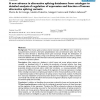Free Online Productivity Tools
i2Speak
i2Symbol
i2OCR
iTex2Img
iWeb2Print
iWeb2Shot
i2Type
iPdf2Split
iPdf2Merge
i2Bopomofo
i2Arabic
i2Style
i2Image
i2PDF
iLatex2Rtf
Sci2ools
132
click to vote
BMCBI
2007
2007
A new advance in alternative splicing databases: from catalogue to detailed analysis of regulation of expression and function of
Background: Most human genes produce several transcripts with different exon contents by using alternative promoters, alternative polyadenylation sites and alternative splice sites. Much effort has been devoted to describing known gene transcripts through the development of numerous databases. Nevertheless, owing to the diversity of the transcriptome, there is a need for interactive databases that provide information about the potential function of each splicing variant, as well as its expression pattern. Description: After setting up a database in which human and mouse splicing variants were compiled, we developed tools (1) to predict the production of protein isoforms from these transcripts, taking account of the presence of open reading frames and mechanisms that could potentially eliminate transcripts and/or inhibit their translation, i.e. nonsense-mediated mRNA decay and microRNAs; (2) to support studies of the regulation of transcript expression at multiple levels, including tra...
Related Content
| Added | 08 Dec 2010 |
| Updated | 08 Dec 2010 |
| Type | Journal |
| Year | 2007 |
| Where | BMCBI |
| Authors | Pierre de la Grange, Martin Dutertre, Margot Correa, Didier Auboeuf |
Comments (0)

